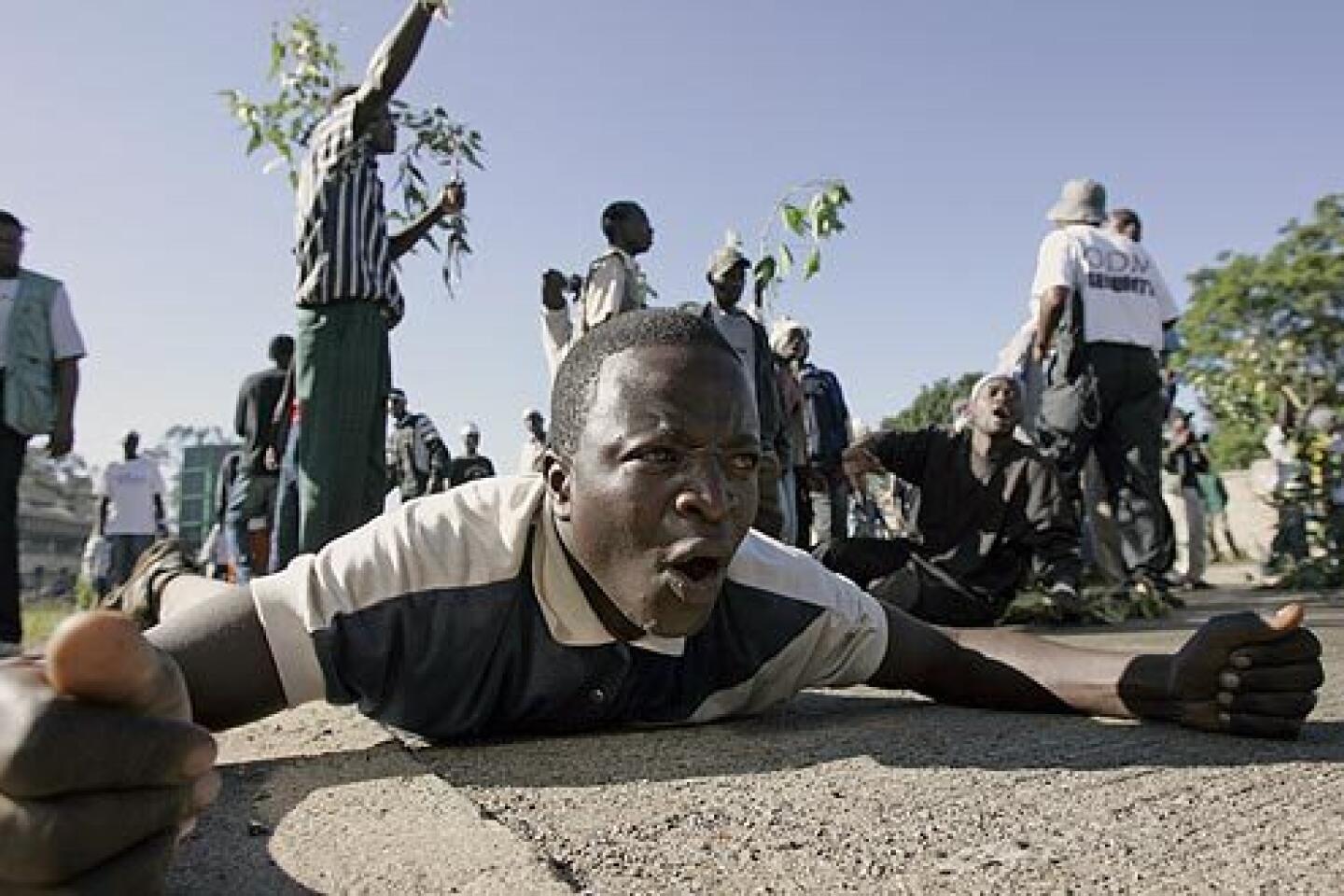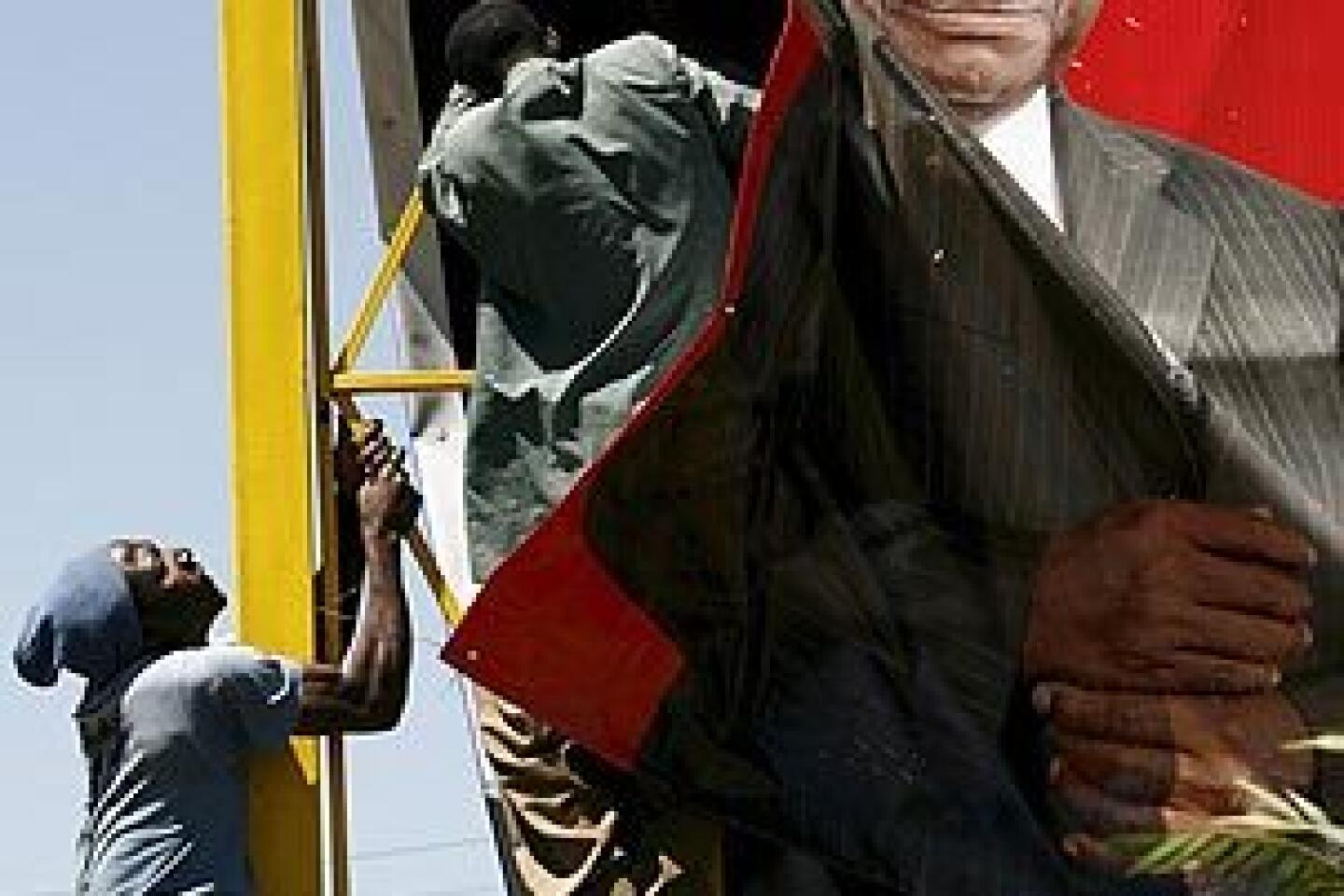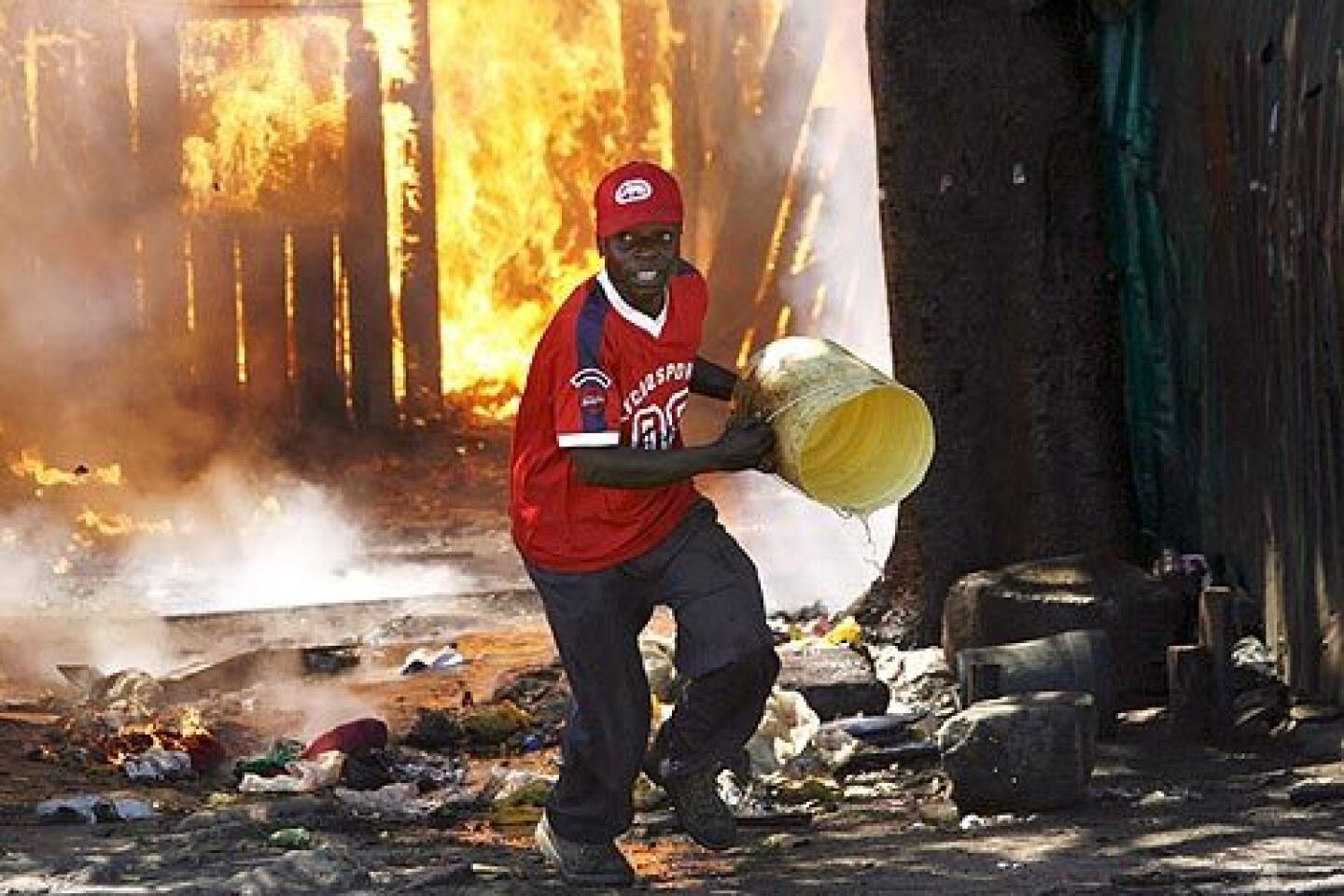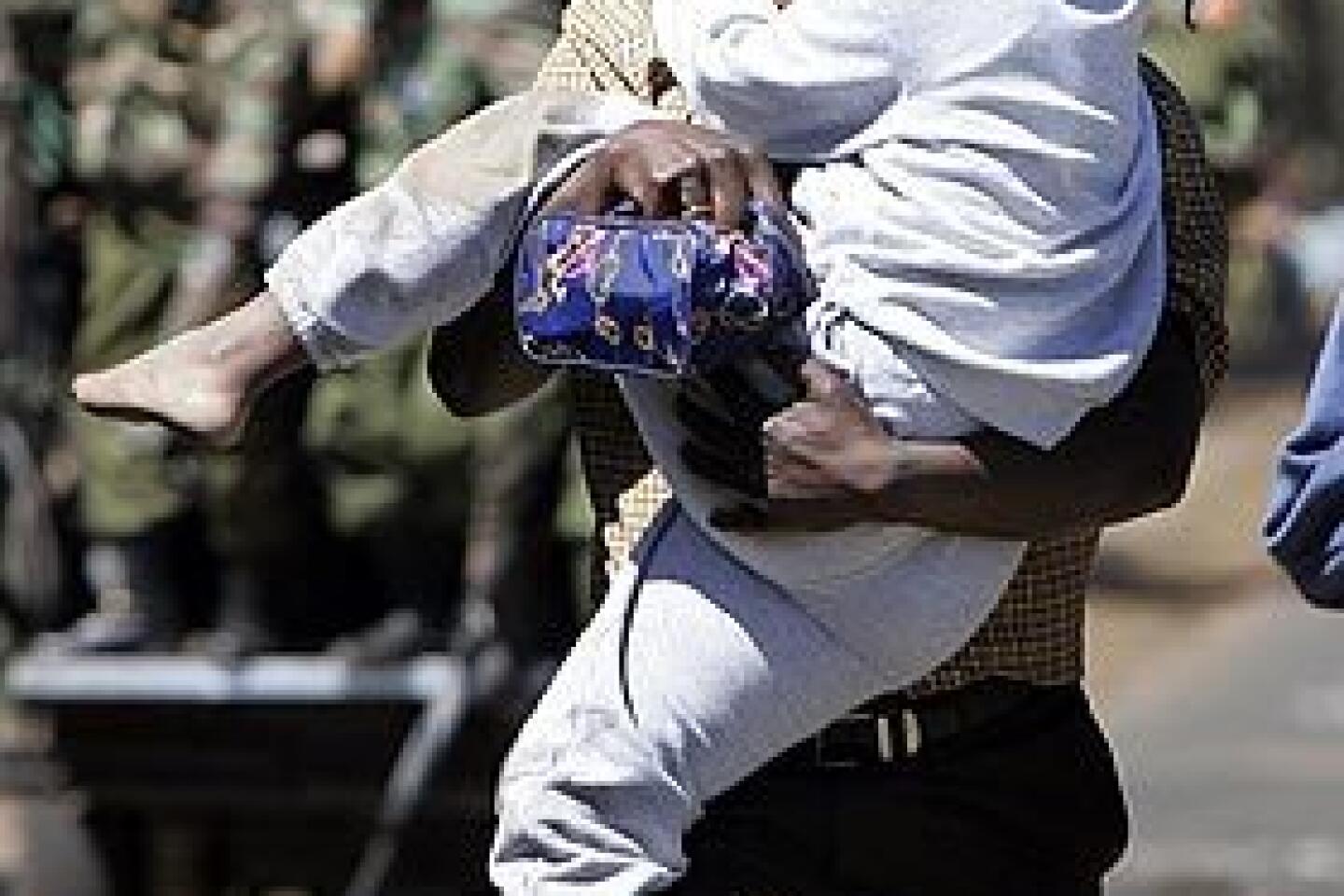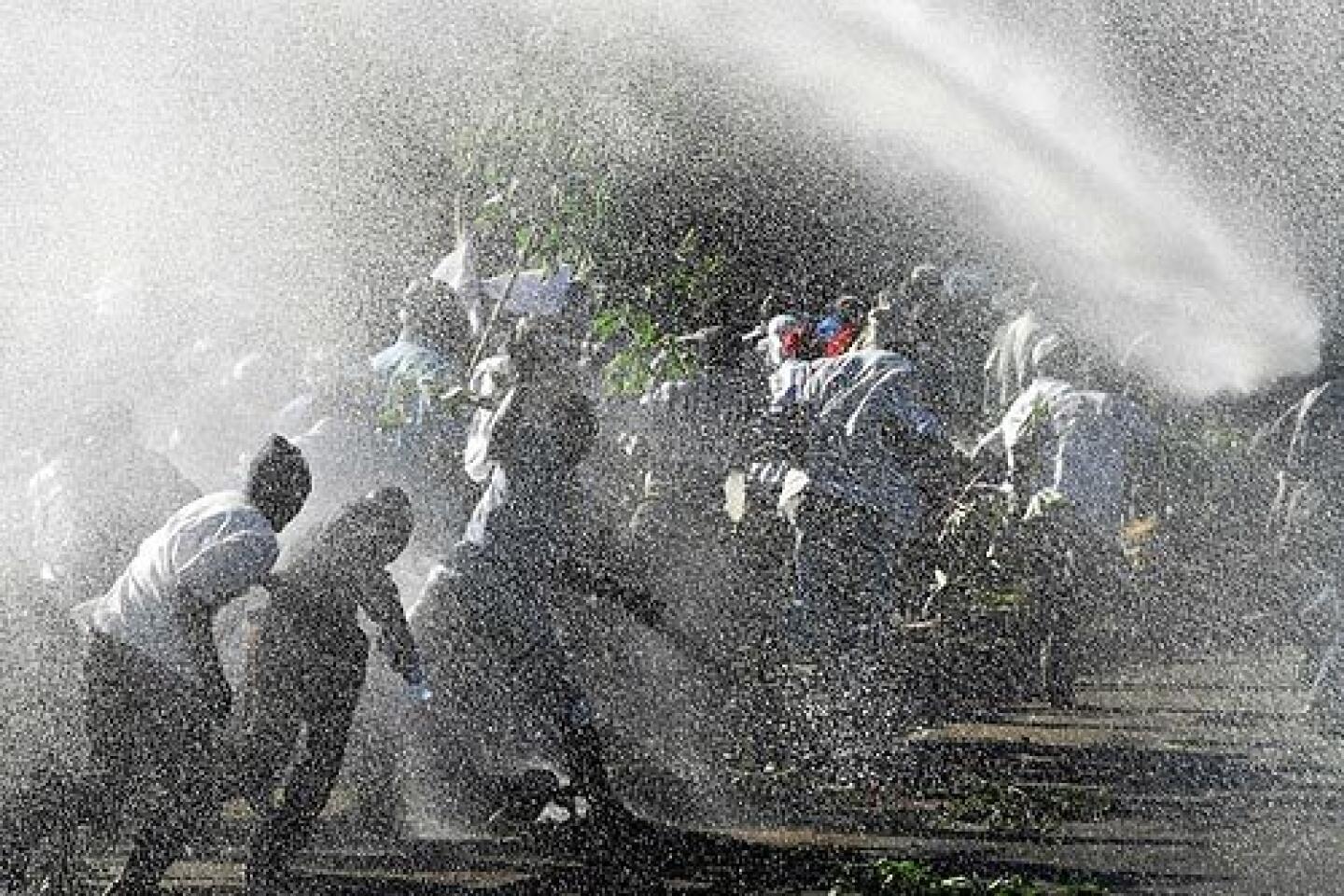In Kenya, a spiral of killings
- Share via
NAIROBI, KENYA — When Gabriel Okelo rose early Thursday to join a banned opposition rally, he did not take his machete. But he was sure he would be using it to kill again very soon.
Just the day before, he said, he had slashed two people to death because they were from a rival tribe.
It wasn’t hard, he recalled. It was night, about 8, and he was among 50 other members of his Luo tribe who rampaged through a suburb nine miles east of Nairobi, the capital, named Uhuru -- “freedom” in Swahili.
“It is the first time I ever killed,” said Okelo, who is about 20. “I never imagined it would come to this. It was not a planned thing at all.
“I was angry. When you are angry, it’s easy.”
Opposition leader Raila Odinga called the rally Thursday to protest what he claims is the rigging of last week’s presidential election by incumbent Mwai Kibaki. Police used tear gas and a water cannon against protesters as they gathered, and Odinga postponed the demonstration. But he announced that one would take place today and every day until Kibaki leaves office.
Desmond Tutu, the South African Nobel Peace Prize laureate arrived Thursday, joining diplomats who were pressing for a political deal to end the violence. But many of those caught up in it, perpetrators and victims alike, feel it’s too late. Life will not return to what it was.
There always has been an undercurrent of tribal tension in Kenya, but the East African country has avoided the kind of wholesale violence that has plagued nearby countries such as Rwanda. The dispute over the election, however, has left about 300 dead from Kisumu in the west to Mombasa on the Indian Ocean.
For Okelo, any deal with Kibaki is unthinkable now.
And to Jane Kagwiria, 32, sitting Thursday with her four children outside an air force base after she was forced to flee tribal violence in Nairobi’s Mathare slum neighborhood, the chances of peace seemed to be ebbing away.
Odinga, like Okelo, is a Luo. Kibaki is a member of the Kikuyu tribe, Kenya’s largest, which other ethnic groups accuse of having dominated politics and business here for decades.
But as days pass, more tribes are being caught up in the violence, and Odinga’s ability to restrain it looks increasingly questionable.
Okelo said the ban on Thursday’s rally would only worsen the violence. He was frustrated and angry: He had walked nine miles from his home to join the protest rally at Uhuru Park in downtown Nairobi, only to find the area blockaded by riot police.
Short and wiry, he spoke in soft tones -- but anger shone in his eyes. As he declared that he had been robbed of his rights, other protesters crowded around him, interjecting the opposition slogan: “No Raila, no peace!”
Some said they wanted guns.
“It’s Kenya versus Kikuyus. We are slaughtering them and we will keep slaughtering them. It will go on and on and on in all parts of the country. It will be war. Religious leaders have been preaching peace. Peace, peace! But there’s no justice,” he said.
Okelo’s claim that he had killed two people the night before could not be verified, but it is clear that there are young men all over Kenya committing similar deeds.
In the slums of Nairobi, corpses with ugly machete wounds keep turning up. Each morning, bodies lie like forgotten parcels in the alleys. But daylight brings no relief. In many areas, the Kikuyus are fighting back, evicting and killing Luos.
The emergency ward at Nairobi’s Kenyatta National Hospital was in chaos Thursday, with doctors rushing about, assessing victims’ chances for survival as they came in. Patients on trolleys crammed the entrance, most with machete cuts, burns or fractures.
Like other of the capital’s slums, Mathare, where Kagwiria lived, is a sprawling maze of rusted corrugated-iron shacks. Its narrow clay alleys are heavy with the stench of open sewers and trash.
As Abbas Gullet, general secretary of Kenya’s Red Cross, plunged in carrying a stretcher Thursday to help out, he had to pinch himself to remember he was in Kenya.
“People are butchering each other like animals,” he said. “It’s not like our country anymore here.”
Gullet and his staff walked a short way through the alleys, now devoid of the usual throb of life: no women washing, no children running and playing.
After a short walk the Red Cross team found a man sprawled on his back on the edge of a sewer. He had been hacked to death by a panga, as the machetes are called here.
Kagwiria escaped the violence but lost her home.
She woke up Thursday not far from where Gullet picked up the body. Gangs of Luos riled over the ban on the protest rally roamed the slum.
A single mother with her four children, Kagwiria is from the Meru tribe. But in her area Merus, Kikuyus and Kambas are being attacked by Luos. When Luos returned to Mathare on Thursday after being denied access to the opposition rally, they burned down a gas station belonging to Kikuyus.
Kagwiria is learning to measure the threat by the screams of people being attacked -- some dangerously near, others far away. Early Thursday afternoon as she was bathing in her shack, she heard a scream from somewhere very near.
“It was one long scream, and then we ran,” she said. She saw a mob of armed Luos approaching.
“I was shocked. I was afraid they can cut me up and kill me.
“You hear the sound of pangas. When they’re coming, they bang them on the doors yelling, ‘Bring out everything and give us everything you have.’ ”
Leaving most of her belongings to be burned and looted, she fled with her children to a small camp outside the nearby air force base, which provided questionable security for families who abandoned their homes. A group of people in a western Kenyan village who sought sanctuary in a church died there Tuesday when a mob barricaded them in, then burned the structure to the ground.
Kagwiria, her head tightly wrapped in a brown scarf, sat on a few cushions beside the mattress and clothing she had managed to carry. Her daughter Faith, 3, runny-nosed and round-eyed, clung to her side. A spider crawled out of the grass and into the mother’s rubber shoe.
Feeling dull and hopeless, she worried where she could find refuge.
“The fighting will continue,” she said. “It will not go back to normal. It will continue because it’s one tribe which is now killing others. I don’t see any hope of peace.”
As night fell in the Kibera slum, one of Odinga’s main strongholds in Nairobi, protester Edward Okoo, 32, said by cellphone that people were still angry. There had been no access to food, water or electricity for days and people’s desperation only fueled their rage.
He said that in Kibera, Luos would never accept a compromise, even if it came from Odinga himself.
“It feels like violence here,” he said.
“The way people are talking here, the violence will continue.”
More to Read
Sign up for Essential California
The most important California stories and recommendations in your inbox every morning.
You may occasionally receive promotional content from the Los Angeles Times.
